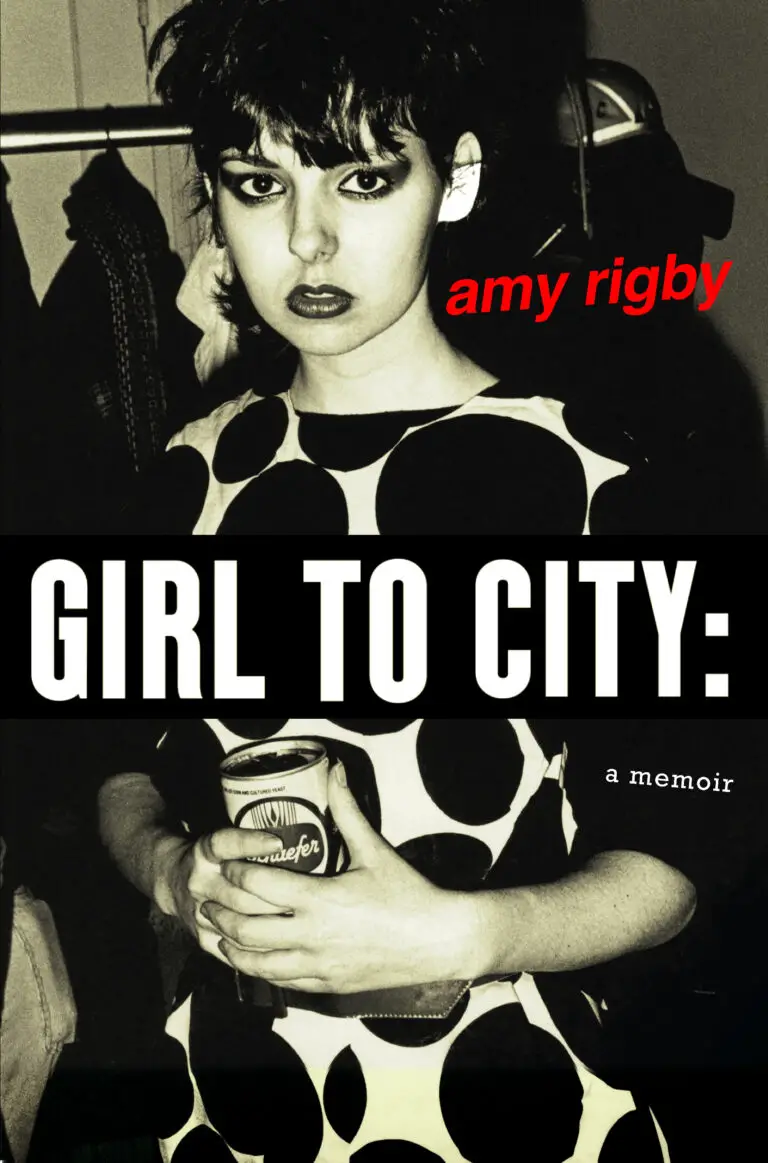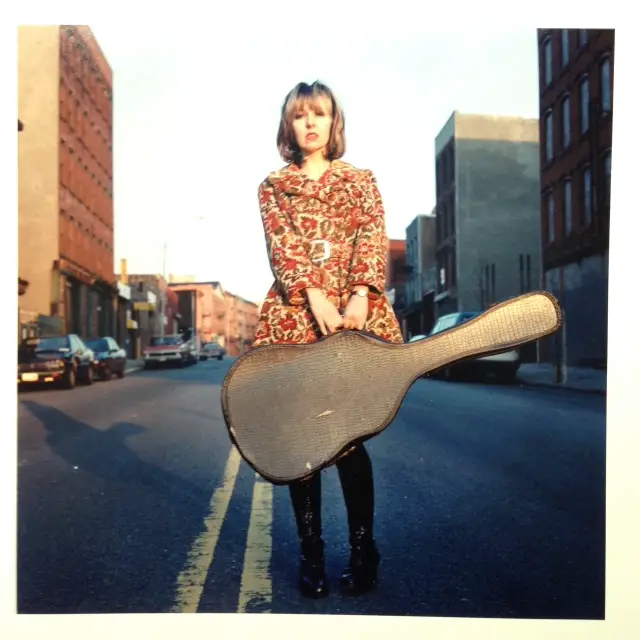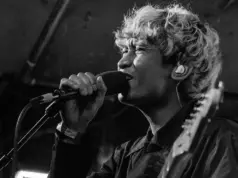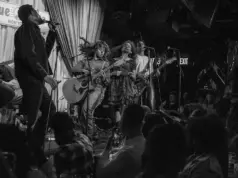

If you want a blast of the dirty ol’ D.I.Y. NYC rock scene of mid-70’s – late-90’s, look no further than Girl To City, the memoir of the critically-acclaimed but never quite platinum-selling singer-songwriter Amy Rigby.

Now quietly residing in Catskill with her musician hubby, the legendary Brit punk Wreck-less Eric of Stiff’s Records fame, Rigby’s story is a unique one of music and young motherhood played out against creative cauldron of the then low-rent, dangerously delicious Lower East Side. Girl to City is the story of her progression from “Elton Girl,” a pop loving rebellious Catholic schooler in suburban Pittsburgh, to Manhattan art student, fledgling alt. country musician/temp office worker to “indie darling,” one who causes a big but, too brief national sensation with her 1996 solo debut, Diary of A Mod Housewife.
As someone tattooed by a Catholic school education myself, I can relate to a good deal of what Rigby has to tell about her early years.
At seven, Amy decides to cast her lot with the music-loving sinners rather than the saints – coming to the realization that she’d rather marry Monkee Mike Nesmith than her powerful first crush, Jesus Christ. Rigby is really lightning struck with the magic of words + music when she hears Dylan for the first time at a Girls Scouts’ picnic in the park, from the transistor radio of a bunch of pot-smoking hippies loafing on an adjacent blanket.
Rigby leaves high school a year early to move to NYC and study the “dying art” of fashion illustration at Parsons. The year is 1976 – the age of Scorsese’s Taxi Driver, CBGBs and The Ramones, the year after that President Ford tells the nearly bankrupt metropolis to “Drop Dead!” on the front page of the New York Daily News. She will move among several apartments on sketchy blocks in the neighborhood until she finally departs for Brooklyn, 15 years later. She is delighted when she spies creative icons like jazz legend Charles Mingus, Television’s Tom Verlaine, John Cage, Brian Eno and Yoko Ono almost daily on the streets.
Rigby enters the thick of the music scene when she takes a job as “a No Wave coat check girl” at the club, Tier 3. It is through this hotspot and others downtown, and a boyfriend named Bob, that she will finally act on her musician/performer aspirations. Her sound is not NYC punk but one shaped by her newfound love of classic country – Merle Haggard, George Jones, Tammy Wynette, Loretta Lynn and the like. From this emerges her first band, The Last Roundup, a cute countrified quartet with her younger brother Michael in tow. This band will have a four-year run, one marked by an exhausting string of gigs in venues small and a few large ones, opening for major acts like The Raincoats. There’s a disastrous trip to Nashville to record an album that won’t see the light of day and a trip to the Midwest to wax one that finally does, Twister, their 1987 debut on Rounder Records.

In addition to music, Rigby has a lot of boys on her mind and in her life. There’s the aforementioned musician Bob and a married Brit called only “The Manager,” someone comes into her life for a whirlwind affair in New York and when she briefly continues her art studies in London. There’s the culture-centric “D,” who introduces her to foreign film and experimental theater, but whose love of heroin she smartly skirts. He is someone who will inspire one of her most memorable songs, “Dark Angel.” Then there’s the ultimately jail-bound street hustler Joe. He’s the kind of guy who drops by a quickie and then asks her to hold onto his pistol (literal, not figurative). Amy will finally settle down and marry Will Rigby, the drummer for the dBs, with whom she will have a daughter, Hazel. He will broaden her musical palate by introducing her to items like the Beach Boys’ Smile bootleg, something she compares to taking LSD or tasting pastrami for the first time.
From The Last Roundup, Rigby will move onto The Shams. This is a group formed with two other girl singers, an outgrowth of their attempts to raise cash by singing Christmas carols on the street and Raffi tunes at children’s birthday parties. It is in this band that Amy’s talent for writing comes to the fore, in tunes like “Down at the Texaco” and “File Clerk Blues,” a number based on her life as an office temp. The group will go on to record a single, an EP and one full-length album for the then-fledgling Matador label, Quilt, produced by Patti Smith’s guitarist Lenny Kaye. As with her entire career, Amy would experience highs and lows with The Shams. There were huge gigs opening shows on nationwide tours for The Indigo Girls and Urge Overkill to nearly empty clubs. There’s even one gig where they “were paid in pierogis.” Regrettably, she can’t tell the other girls she wants to go solo and ultimately breaks up with them via fax.
Through her time with these bands, Amy would be struggling with motherhood, finding someone to care for her young daughter when she or her drummer husband were away on tour, at rehearsals or recording. The always on tour lifestyle would ultimately lead to the breakup of her marriage to Will.
Bravely, Rigby also addresses the financial realities of the music business at this level. She spends a good deal of time reminiscing, often positively and humorously, about the string of day jobs she takes to make ends barely meet – from serving ice cream to celebs like actress Sandy Dennis to temping in real estate offices and the legal department at CBS Records. She provides a refreshing view on what many musicians would consider an obstacle – saying that these days jobs are a part of a musician’s life, not something that stands in the way of it. She reminds us that they were also a way to get free photocopies for the street posters and mailers that were an important promo device for musicians in the pre-social media era. And it is through the CBS job that she will meet the man who champions her and lands her a deal to make her solo debut for Koch Records, 1996’s Diary of A Mod Housewife, produced by The Cars’ Elliot Easton.
“There was one month in my adult life, August 1996, when everything went right,” writes Rigby. That was the month her debut album came out to glowing reviews in Rolling Stone, People, Billboard, Entertainment Week and many more. Amy even scored an interview, one she thinks in retrospect might’ve been too revealing, with NPR’s Terry Gross on “Fresh Air.” Interestingly, she recently did a second interview with Gross to promote this book.
But for all the promise, Rigby is back working at CBS in a little over a year. Her critically-applauded debut only sells around 20,000 copies, at a time when contemporaries like Liz Phair and Sheryl Crowe will hundreds of thousands and millions respectively.
Regrettably, this is kind of where Girl to City wraps up this installment of her life story, with a slight jump ahead in the prologue and epilogue to her daughter Hazel striking out as a musician on her own. But there is so much more to tell.
With a hell of a lot of heart and dignity, Rigby has continued to do what she did then – write and record quirky, interesting story songs, ones loved by a modest cult of literate music-lovers. She continues to make albums and periodically tour, playing to adoring audiences in modest venues here and abroad, usually solo but sometimes with her husband Wreckless Eric Goulden. At the conclusion of Girl to City, she spent a few years working as a songwriter in Nashville and several years in France with Eric. She also continues to periodically work those day jobs to make the ends of an itinerant artist’s life meet, notably in an Upstate N.Y. bookstore whose staff helped light a fire under her to write this story.
From the verbal flow to the emotion and insight imparted, Rigby has discovered another great talent – that of putting words on paper, sans the music. She has always been a great story-tellers who, until now, has limited her writer’s gifts to the three-minute song.
For those who lived through this era of NYC, Girl to City is a real trip down memory lane. It comes complete with all the touchstones – the post-gig chow downs at Wo Hops or Kiev, seeing Basquiat or Keith Haring scribble their art on tenement and subway walls, the sights and smells of the bathrooms at CBGB and much more. It all comes into sharp focus in Amy’s writing.
Memoirs of life in the East Village of this era are now a growing cottage industry. There are many entries but very few that are as good as Amy’s and John Lurie’s recent autobiography.
Like much of what she had done, Girl To City is a gutsy D.I.Y. project, self-published by Amy’s own Southern Domestic imprint, which can be found at her website, www.amyrigby.com You can head here to sample her music, on-going blog and a podcast version of this fine book.
The post A Rocker Mom’s Roller Coaster Ride Comes to Life in Amy Rigby’s “Girl To City” appeared first on NYS Music.



![Maggie Rose Talks ‘No One Gets Out Alive’, Don Hart, Gamehendge, & Her Triumphant Ham Sandwich [Interview] IMG 1604](https://utterbuzz.com/wp-content/uploads/2024/04/IMG_1604-238x178.jpg)




